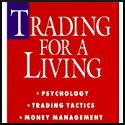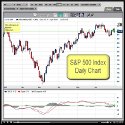 I’m not perfect, but then you’ve probably already deduced that. I thought I’d share some experiences with you to show how when people abandon their plan it can be demonstrative of the worst kind of psychological trading problems. These are exactly the kind of things that kill you when you’re making a trade — You enter into your position with a plan and then you decide something has “changed things,” so you abort the plan. In the end you always pay the price for this kind of behavior.
I’m not perfect, but then you’ve probably already deduced that. I thought I’d share some experiences with you to show how when people abandon their plan it can be demonstrative of the worst kind of psychological trading problems. These are exactly the kind of things that kill you when you’re making a trade — You enter into your position with a plan and then you decide something has “changed things,” so you abort the plan. In the end you always pay the price for this kind of behavior.
2009 has gotten me this way a couple of times. The problem is that I genuinely believe we’re in circumstances unlike any we’ve seen before. This causes me to “rethink” things far too often for my own good. Here’s a typical example of what I’ve done a couple of times. I decided at one point to go long TLT (Long Term Treasuries) as a hedge against some other positions. I sold a call off the position as well to limit my downside. The plan was if the trade moved the other way I would double up the position to increase my exposure and even out the hedge.
So of course TLT has a huge downward move, much larger than I expected. I start thinking about the economy and I get worried and I decide just to let my current position ride instead of doubling up. Of course TLT recovers part of the way. Had I doubled up my position as I had planned when I entered the position, that trade would have become a neutral one. Instead it was quite a loser and offset the gain in the position it was hedging.
[More]
 If you’re trading without a “stop,” you are playing Russian Roulette with your money. “Stop Loss Orders” or “stops” are orders you place with your brokers to indicate that if your position moves against you to a certain point you will exit the trade. You have a “stop price” where if the issue trades at that price or worse, the order turns into a market order to sell or buy. Many traders don’t actually place the order but have a price at which they will exit the trade, which they still call a “stop.” In fact some traders prefer not to place an actual order because they fear they will influence price execution and get “stopped out” when they wouldn’t have otherwise. Regardless of how you execute the exit, you should never enter any position without a price at which you know you’re wrong and get out of the trade.
If you’re trading without a “stop,” you are playing Russian Roulette with your money. “Stop Loss Orders” or “stops” are orders you place with your brokers to indicate that if your position moves against you to a certain point you will exit the trade. You have a “stop price” where if the issue trades at that price or worse, the order turns into a market order to sell or buy. Many traders don’t actually place the order but have a price at which they will exit the trade, which they still call a “stop.” In fact some traders prefer not to place an actual order because they fear they will influence price execution and get “stopped out” when they wouldn’t have otherwise. Regardless of how you execute the exit, you should never enter any position without a price at which you know you’re wrong and get out of the trade.
The Psychology of the Stop
The psychology of trading is fraught with peril. In many ways once the trade is on you can become fixated on making that trade work out. The problem is, when you’re doing the research and working out your trade, you’re perfectly rational. Once you’ve placed the order however, you can start lying to yourself and costing yourself money by convincing yourself to stay with a trade that’s turned against you. By always trading with a stop, you can set the extent of your trade while you’re still acting completely rationally. This can be a huge money saver. [More]

Mastering psychology is easily as important as any other type of analysis involved in trading markets. There are two psychologies you need to be worried about, the markets and your own. Your own is much easier to read but can still be very hard to control.
Discipline
Trading psychology is much easier to identify than to control. Many times when we’re trading we will decide that this particular case requires a different set of rules than the usual case. This is usually the first step towards a bad trade.
Ups and Downs
One of the first issues you will have to purge from your behavior is the mood swings that can come from trading. When you win you are a genius, when you lose you are a failure. Eventually, if you are going to be successful, you must learn to simply see wins and losses as inevitable parts of the process. Wins and losses have hundreds of different sources and your primary goal should always be to put the odds in your favor. You can make the right decision and still lose money or leave money on the table. You want to be a trader, not a gambler.
Getting Your Money Back
One of the most damning reactions to losing money is to try to “get it back.” Once again you must view losses as simply parts of the process. You will have losses. There’s no way around it. If you can be right even half the time, with good money management that can be enough to make a fortune. However if you let your losses destroy you in a desperate attempt to “win” every trade, you are doomed to turn minor losses into catastrophes.
Self Destruction
Another characteristic that plagues traders is the instinct to take a success and turn it into a loss. As people decide they are brilliant and have “beaten” the market, they start to take more risks and bend their rules. This is when they turn self-destructive and bring ruin on themselves. Just as you can’t let your losses destroy you, you can’t let your wins do so either.
The Rules
The key to successful trading is to develop your rules and then stick to them. You need to develop your own system and don’t let dreams of riches or fears of doom derail you. While it’s important to always be updating and tweaking your system, you mustn’t develop them in the middle of a trade. While your psychology can be difficult to master, once you have you need only start to try to identify the market’s psychology. Thus you’ve removed dangerous variables.
 I’m not perfect, but then you’ve probably already deduced that. I thought I’d share some experiences with you to show how when people abandon their plan it can be demonstrative of the worst kind of psychological trading problems. These are exactly the kind of things that kill you when you’re making a trade — You enter into your position with a plan and then you decide something has “changed things,” so you abort the plan. In the end you always pay the price for this kind of behavior.
I’m not perfect, but then you’ve probably already deduced that. I thought I’d share some experiences with you to show how when people abandon their plan it can be demonstrative of the worst kind of psychological trading problems. These are exactly the kind of things that kill you when you’re making a trade — You enter into your position with a plan and then you decide something has “changed things,” so you abort the plan. In the end you always pay the price for this kind of behavior. If you’re trading without a “stop,” you are playing Russian Roulette with your money. “Stop Loss Orders” or “stops” are orders you place with your brokers to indicate that if your position moves against you to a certain point you will exit the trade. You have a “stop price” where if the issue trades at that price or worse, the order turns into a market order to sell or buy. Many traders don’t actually place the order but have a price at which they will exit the trade, which they still call a “stop.” In fact some traders prefer not to place an actual order because they fear they will influence price execution and get “stopped out” when they wouldn’t have otherwise. Regardless of how you execute the exit, you should never enter any position without a price at which you know you’re wrong and get out of the trade.
If you’re trading without a “stop,” you are playing Russian Roulette with your money. “Stop Loss Orders” or “stops” are orders you place with your brokers to indicate that if your position moves against you to a certain point you will exit the trade. You have a “stop price” where if the issue trades at that price or worse, the order turns into a market order to sell or buy. Many traders don’t actually place the order but have a price at which they will exit the trade, which they still call a “stop.” In fact some traders prefer not to place an actual order because they fear they will influence price execution and get “stopped out” when they wouldn’t have otherwise. Regardless of how you execute the exit, you should never enter any position without a price at which you know you’re wrong and get out of the trade.


